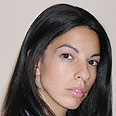
Only matter of time until seculars drive on Kippur
'There is no doubt, and remember where you heard it, that empty Tel Aviv streets will soon be filled with traffic on Yom Kippur,' says Tali Farkash, who believes taboo against driving on holiday is about to be broken
Once, many years ago, I did Yom Kippur in Tel Aviv. Between the Mussaf and closing prayers, I wandered around the streets of the first Hebrew city. I stopped at the closed coffee shops near Habima Theater. I looked into the silent storefronts at Kikar Hamedina. On that day, families dressed in their holiday finest walked along Dizengoff Street. Little girls in patent-leather shoes and little boys in white shirts played with a ball near Namir Road.
Throughout this entire Yom Kippur trek, my girlfriends and I walked in the middle of the street and breathed in the sea breeze that broke through the everyday clouds of soot and pollution. The Tel Aviv foreign to a religious girl like me was enshrined in a familiar holiday atmosphere. All of a sudden, Tel Aviv felt a little like Bnei Barak.
Even those who don't believe in miracles stood in wonderment as the city that never sleeps held its breath. Theories flew threw the air about some mysterious force that stopped the migration of the steel monsters along the Ayalon Highway, that morphed Tel Aviv into a meditative and pensive spot. The evasive element that changed people who on a daily basis prefer to see synagogues as an interesting architectural structure and the prayer book on the shelf at grandma's house into something that I will cautiously label "different." Indeed, "let us express the mighty holiness of this day."
However, like any culture from the forbidden past, these empty streets are also destined to be traffic-filled. For many years now, a Kippur civil disobedience has been developing alongside the families walking in the streets. For these residents, sitting on a bench alongside an empty street and not in their favorite coffee shop for 24 hours is torture in and of itself. Because their lives are not alive without their latte. Without it, maybe it really is better to fast.
Even before the screen emblemizing the Israeli electronic experience of the 21st century is taken off the air, they will argue vociferously with the cable company about the lack of appropriate entertainment for passing the day of nothing and will run in panic to the nearby video store to arm themselves with a set of DVDs of this show or that, of the last season, in order to pass the hours upon hours of staring at the plasma on the wall. Grumbling about the silence coming over the radio channels, they pray long and hard that this horrible and terrible day will be over. Because only "a still small voice he heard."
Free minority's tolerance bursting
No doubt, and remember where you heard it first, the secular culture war will be felt by us on upcoming Yom Kippur holidays – without a haredi touch of hand. The tolerance of the free minority is bursting. Until when will they be coerced into foregoing the barbecue on the roof during their day off because the neighbor will crinkle her nose? Until when will they be forced not to take advantage of the quiet intersections in order to go visit their parents in Givatayim? After all, the Tel Aviv kids on rollerblades and bikes won't shout at them "Yom Kippur!" – what are they? Dosim (a derogatory term for religious people)?After all, it is the era in which every Jewish holy cow has been slaughtered in the city's radius. Only Yom Kippur is left to kill, its ashes to scattered with the exhaust of the cars that will return to plough through the asphalt fields. And a redeemer comes for the Tel Avivians going to Rhodes on the holiday. Indeed there is something threatening about the total isolation that Yom Kippur imposes on those isolated from the Jewish religion – those uninterested in synagogue or reading Amos Oz quietly without the background noise of motors. So, in the maddening quiet, all the significance of atonement is likely to seep out. The Jewish bookkeeping of self-examination, of whom did I do what to and why, is likely to rear its ugly head.
In the center stands the unsure, angry Jew. Angry about the day without distractions, angry about the voice of the family, couple, fraternal voice of the street walking undisturbed below. He is outraged at the synagogues teeming with people, instead of the night clubs at the Port. At the people in prayer shawls, at the country in atonement, because all of a sudden, Tel Aviv feels a little bit like Bnei Barak to him.










